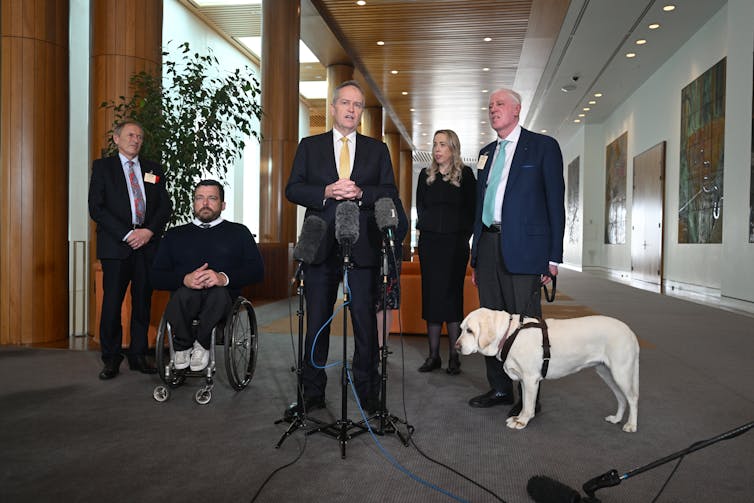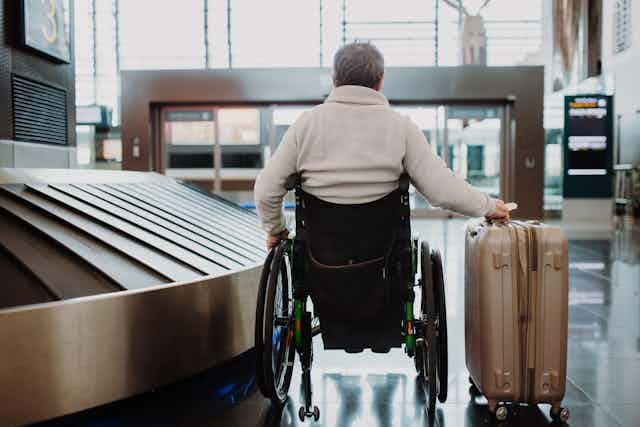Australia’s former disability discrimination commissioner, Graeme Innes, has settled his dispute with Adelaide Airport. His complaint to the Human Rights Commission was lodged after being denied access to a body scanner with his assistance dog in May 2022.
Unfortunately, Innes’ experience will resonate widely with Australia’s 4.4 million people with disability.
“People with disability know how challenging air travel can be, and that experience needs to be more inclusive,” said Innes, who was disability discrimination commissioner for nine years and is on the board of the National Disability Insurance Agency.
Experiences like Innes’ have been widely reported and have happened to prominent Australians with disability. The everyday experience of air travel is likely even more shocking. Change is happening, but it is moving slowly.
Read more: What does a building need to call itself 'accessible' – and is that enough?
Airport and airline ableism
The Human Rights Commission received more than 100 disability discrimination complaints against airlines in the six years to 2022, including the period in which COVID restrictions saw air travel severely limited.
Issues included:
- assistance animal refusals
- inaccessible facilities
- inaccessible ticketing arrangements for people with vision impairments
- taxis and rideshare providers not turning up, long delays or refusing passengers with disability aids and/or assistance animals.
These issues highlight a system underpinned by unchallenged ableism – discrimination that favours people without disability.
Freedom of movement
An important right under the United Nations Convention on the Rights of Persons with Disabilities is freedom of movement. This right seeks to enable all people to be included in society in ways they self-determine.
Ableism in air travel is a fundamental denial of independence and freedom of movement. Discrimination can be even more blatant and offensive. People have been removed from flights or denied boarding because there are limits on the number of wheelchair users who can access an aircraft or because they require additional support to access facilities.
People with disability report the removal of, or damage to, personal mobility equipment, and lack of suitable equipment. In the most severe cases, people have been injured during travel or left stranded in dangerous circumstances.
Inconsistency can fuel ableism
Inconsistent policies and practices significantly impact travellers with disability. This is made worse by the fact that individual airlines and airports are encouraged by government to develop their own Disability Access Facilitation Plans.
So, it is not surprising when news reports highlight instances of assistance dogs being denied travel domestically and internationally, even when they’ve previously been approved by other airlines.
Lack of consistency, negative attitudes, stereotypes and prejudices in the air travel industry have resulted in reportedly aggressive eviction of passengers with disability from exit rows. Others report being told to “catheterise” (to insert a tube through the urethra to the bladder) to avoid needing toilet facilities on an overseas flight. Many people with disability experience situations like Innes’ where they are subjected to alternative, sometimes undignified, processes.
Ongoing experiences of ableism not only deny people with disability their rights to travel but can also damage their dignity. Anticipation of discrimination can increase anxiety and stress for travellers with disability or prevent them travelling altogether.
Read more: Here's why we need a disability rights act – not just a disability discrimination one
Slow reform
These stories and many others point to the need for urgent reform.
Stories shared by more than 60 participants in a special Disability Royal Commission session prompted its chair to write directly to the CEOs of Australian airlines and airports, urging them to work on solutions.
The review and modernisation of the 2002 Disability Standards for Accessible Public Transport along with the upcoming release of the Australian government’s Aviation White Paper could be key mechanisms to address systemic discrimination. But only if key recommendations from disability organisations and advocacy centres are adopted. They include:
specific standards for air travel co-designed with people with disability and representative organisations. Universal design aims to make products and environments usable by all people, without adaptation. It can play an important role in overcoming the systemic barriers in infrastructure and service design to create more seamless and inclusive transport and air travel experiences
reportable and enforceable standards and independent oversight, such as funding the Human Rights Commission to oversee compliance.

Read more: A new year means new fitness goals. But options for people with disability are few and far between
Complaints are just one route
The exclusion of people with disability from seamless airline travel is a violation of their fundamental right to freedom of movement.
Decades of travel horror stories in the media, continuing legislative reviews and national enquiries should bring change. Everyone should be able to make journeys with dignity and autonomy. People with disability deserve the same travel privileges as non-disabled Australians.
Governments and the aviation industry will need to collaborate to implement comprehensive accessibility measures, ranging from wheelchair-friendly facilities to trained staff capable of providing appropriate assistance. Embracing inclusivity in air travel not only aligns with the principles of equity but also contributes to a society that celebrates diversity.
For now, there are a number of ways to raise complaints, including with the individual airline or with the Human Rights Commission. Raising complaints with the Human Rights Commission can be completed by anyone who experiences discrimination. Legal support and advice may also be sought from some state-based legal aid organisations.
While complaints are one mechanism for change, more proactive methods for change include the disability royal commission’s recommendation for the design and implementation of a Disability Rights Act, which would see human rights enshrined in legislation and facilitate barrier-free travel.

